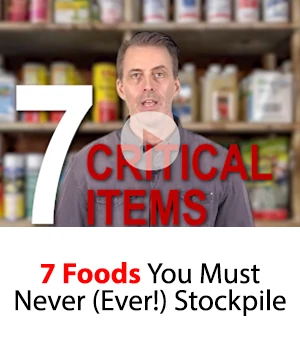Naturally, parents want their kids to stay safe and secure. And for this very reason, some families tend to avoid risky activities like camping.
But the truth is camping is a fun experience that is worth having. If kids know basic safety tips – they will be okay even if something unexpected happens.
Let’s talk about how to get your children prepared for a camping adventure. And let’s take a look at the list of essential camping gear that you’ll need for your next camping trip.
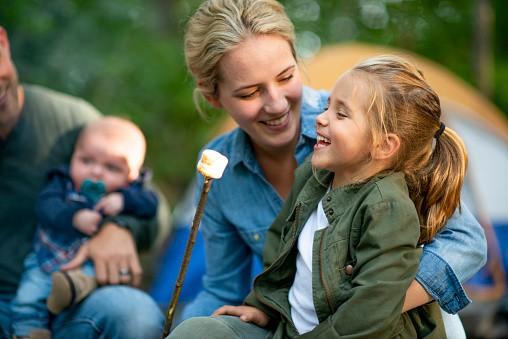
Basic Survival Tools
When camping with kids, you need to be prepared for the unexpected. You need to have all tools necessary to protect your kids from wild animals and insects, bad weather, and other dangers.
Also, you should consider a scenario in which your family or your kids get lost in an unfamiliar place. What camping supplies will you need to survive and get rescued?
1. Rain Poncho
Weather is unpredictable, and you never know for sure whether it will be raining tomorrow or not. So it’s better to pack rain ponchos in your and your kid’s backpack.
A rain poncho is an inexpensive yet handy item. It can be used not only to prevent clothing from soaking, but also to build a shelter, collect rainwater, and many more.
2. Emergency Blanket
An emergency blanket (also known as a Mylar blanket and space blanket) is an essential piece of a kids’ survival kit. If your kids will get separated from you and have to spend a night in the forest alone, they will use the blanket as an emergency sleeping bag.
Well, a space blanket can’t substitute high-quality sleeping pads in normal conditions. But still, it’s a good alternative in case of need.
3. Headlamp or Flashlight
Are your kids afraid of the dark? Provide your children with reliable headlamps or flashlights with high-capacity batteries on their first camping trip. If children get lost, at least you will know that they will not stay alone in the darkness paralyzed with fear.
When choosing a headlamp or flashlight, pay attention to the items that are lightweight, easy to use, and fast to charge. Such lighting tools suit young campers the most.
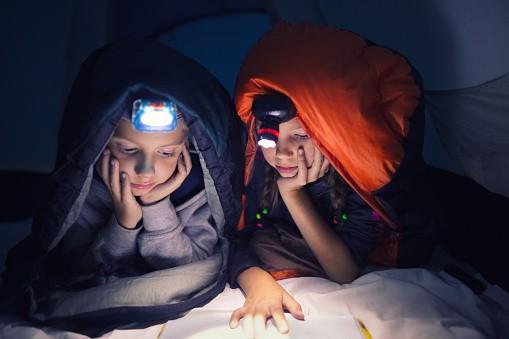
4. Glow Sticks
Have your kids already used glow sticks at birthday parties and school discos? That’s great. Now you need to explain to your kids how they can use this fun item as a survival tool.
A flashlight may run out of battery, while glow sticks can provide your kids with light all night long. If your kids use sticks properly, they will help rescuers to find them in the dark.
We highly suggest you choose the glow sticks of bright loud colors. In emergency situations, they work the best.
5. Emergency Whistle
An emergency whistle is another essential survival tool for young campers. By whistling, kids can attract rescuers’ attention and get help sooner.
In contrast to shouting, whistling doesn’t require much effort. Kids can keep blowing the whistle for hours until getting rescued.
Haven’t bought an emergency whistle yet? Choose the loudest resistant whistle you can find in the market – it’s the best option for kids’ survival kits.
6. Water Filter
For surviving in a wild place, we need to have access to clean drinking water. But the point is that when we travel, we don’t know exactly which of the springs are suitable for drinking.
To solve this issue, you need to use specialized water filters. They allow to purify water from springs, lakes, and rivers and make it drinkable without boiling.
Never used a water filter before? This survival tool is definitely worth buying. Try it out! And explain to your kids where they can find water while camping and show them how to use a water filter.
7. Outdoor Survival Knife
Everyone in your family who is older than ten years should have an outdoor survival knife. Knives will go in handy when you need to cut dry branches of the tree to fuel your fire or to build a shelter.
On the web, you can find outdoor knives designed for kids. They are durable, practical, and cute. Knives for kids are available in bright, fun colors and specialized safe packaging.
8. Backpackers Trowel
A lightweight trowel can be used in various ways. For instance, you can use it to dig out a fire pit or bury organic waste. A small trowel will not take much space in your backpack but will enhance your camping experience a lot.
9. Fire Starter
Do you know how to rub sticks together to make a fire? No? Then you should better pack into your backpack waterproof matches and a magnesium fire starter. They will help you to start a fire in any place in any weather conditions so you can cook dinner for your kids and spouse.
This simple tool will help you to create sweet campfire memories. These memories will be extremely precious, and they are definitely worth skipping a few days of school and using a reliable writing service instead.
10. Microfiber Pack Towel
Regular bath towels are not suitable for camping. They take too much space, and they are too heavy. So it’s highly recommended to get a few microfiber towels that absorb water quickly and dry fast.
If it happens that your family gets caught in a rainstorm, these towels will be lifesavers. They will help you to get dry and comfortable in a minute.
11. Duct Tape
Duct tape is another essential tool for camping. You can use it to make repairs of any broken items or to build a temporary shelter. Also, you can teach your kids how to use it in case of an emergency.
Medical tools
Talking about survival tools, we can’t help but mention the following essential medical goods. All of them are affordable, and you can find them at a local pharmacy.
12. First Aid Kit
When it comes to adventurous and risky activities like camping, a first aid kit is a must. Well, if your son is 5-year old, it’s unlikely he will manage how to use roll bandages. But if your kids are ten years and older, you can teach them how to use the first aid kit.
Here is a list of items that first aid items that your survival kit for camping should include:
- Personal medications (for instance, asthma inhaler)
- Roll bandages
- Adhesive tape
- Antiseptic wipes
- Scissors
- Antiseptic creams and ointments
- Pain and anti-inflammatory medicine
- Hydrocortisone cream
Besides, we highly suggest you add personal information or contact person information to your first aid kit. That would help your family a lot in case of an emergency.
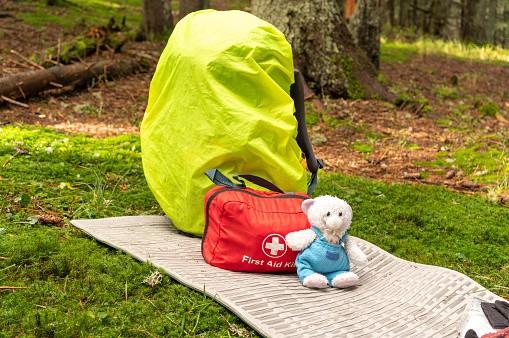
13. Sunscreen
Sunscreen is essential, no matter where and when you are going to camp. While camping, you expose your skin to the sun almost 24/7, so you need to use sunscreens to prevent sunburns.
Seriously. Even if it seems to be cold and cloudy, sunscreen is a must. No matter whether you will visit the desert or mountains, you need to buy sunscreen with an SPF of at least 30.
14. Insect Repellent
Mosquitoes, bugs, ticks, and other insects can endanger the health of your kids since they can transmit various infections. So make sure that your survival kit for camping includes a high-quality insect repellent.
Insect bites usually cause painful, itchy rashes that can make the camping experience unbearable. So make sure your kids apply repellent every few hours.
Snacks and Long-Life Foods
Your kids must have some food in their backpacks. In case they get lost, they will have something to eat while waiting for rescue. Here are a few ideas about what snacks and non-perishables you can buy for camping.
15. Dried Fruits, Nuts, and Seeds
The best survival snacks are dried fruits, nuts, and seeds. They can be stored without a fridge and carried in a backpack.
Dried cranberries, figs, apricots, prunes, raisins, walnuts, almonds, cashews, sunflower seeds, and similar foods are rich in vitamins and minerals. They are nutritive-dense and, most importantly, they are healthy. Kids can eat dried fruits and nuts on the go at any time of the day.
16. Energy Bars and Candies
If your kids are not big fans of healthy snacks, you can buy energy bars and candies. A few candies will not harm your kids’ health, but help to keep energy levels high. Even more, if you provide your kids with their favorite sweets, they will be in a good mood and be less stressed out if something unexpected happens on your picnic tables.
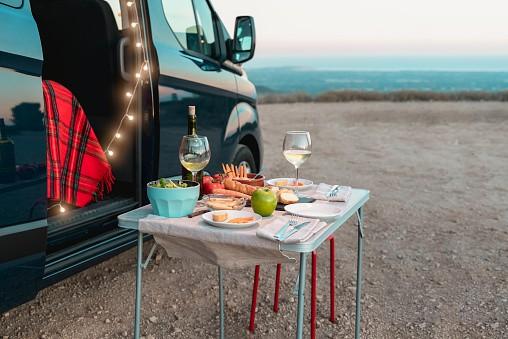
17. The Survival Tabs 4-Day Snack Food
The Survival Tabs is a unique snack that can be considered as a meal replacement. It’s high in protein, vitamins, minerals, and other nutritive elements. And it’s pretty tasty. The best thing about this snack is that it’s compact and won’t take much space in your kid’s backpack or pocket.
So, be sure to follow this camping checklist before you start camping with kids involved. Also, follow our camping hacks for further help.
Some Tips On Camping With Kids
There are many things to consider when planning a camping trip with children. For example, kids need to bring their own sleeping gear like sleeping bags and flashlights, they should be allowed to play in nature, and you shouldn’t expect them to be able to hike long distances.
But there are also some other considerations that parents need to make to ensure that their family camping trip is fun and safe for everyone.
1. Involve Them In The Planning Process
Kids love to be included in family activities, especially if they feel like they’re part of it. This means sitting down with your children while you plan out your trip and chatting with them about what to bring on their trips, where you’ll be going, how long you’ll be staying, who else will be there, etc.
It also helps parents get to know what types of things their kids are interested in so they can help prepare them for all aspects of the trip. Also, they can provide kids camping ideas for an outdoor adventure.
2. Practice Camping At Home
This doesn’t mean dressing up in your mom’s old wedding dress and building fake campfires in your living room (although that’s a pretty good idea too). You can try having “camp night” or “pack up your car and go tent camping night”, where the kids help set up their bedrooms like they’re tents and you roast hot dogs and eat marshmallows for dinner.
It helps them prepare mentally and physically for what to expect when it comes time to leave on the actual trip and gives them a chance to voice any concerns they may have about whether or not they’ll enjoy camping out.
3. Leave The Electronics At Home
Some parents think that bringing an iPad, video games, etc along is a great way to keep their kids busy while camping. While this may be true, such devices also send the wrong message. They convey to children that technology is more important than the beauty of nature.
Also, they send kids the message that being “plugged in” is more enjoyable than actually enjoying their surroundings. While it’s perfectly fine for adults to bring along devices they enjoy, kids need an opportunity, or at least one day per trip, where they can simply unplug from the world.
4. Practice Leaving No Trace
Just because you’re in nature doesn’t mean you have to leave behind a giant mess when you leave. While this may seem like common sense, many people don’t realize how much trash they make over the course of a weekend camping with family or friends.
For example, if your campsite has metal fire pits, be sure to clean them completely before you leave. If you’ve got kids, make sure they understand how to properly dispose of the trash instead of leaving it lying around the campsite.
And finally, if you’re planning on taking any hikes along your trip, be sure that everyone wears appropriate clothing and shoes so that they don’t accidentally do more damage than good.
5. Plan Easy Meals And Snacks
Kids tend to get hungry an awful lot, even if their parents are lucky enough not to have ravenous teenagers always begging for food. But besides snacks like trail mix or beef jerky, camping trips sometimes call for unique foods like hot dogs on sticks (toasted marshmallows sandwiched between pieces of white bread and wrapped in bacon).
This is why it’s important to plan your meals ahead of time and bring all the necessary food (and utensils, like knives for slicing fruit or cooking meat) you’ll need.
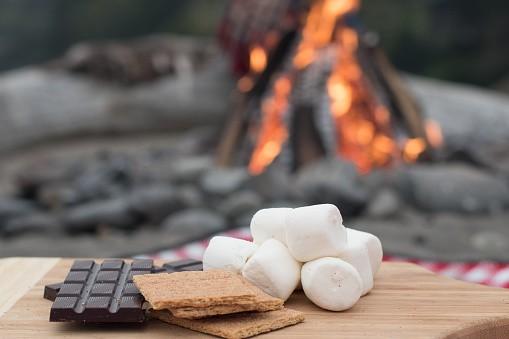
6. Keep It Simple
Kids may love camping, but they also have a relatively short attention span. For example, if you’re planning on fishing as a family activity, don’t expect anyone child to enjoy sitting still for hours at a time just waiting to catch something.
Instead, take turns going out into the water/catching bugs/looking for stones. It ensures that everyone gets their fill of outdoor fun within a reasonable timeframe.
Also remember that even though kids might whine about being bored now, they’ll cherish those memories when they’re older. Trust me, you’ll be glad you took them out there and let them experience the beauty of nature.
7. Pack First Aid Items
Kids can get hurt anywhere at any time, whether it’s from a fall while running around chasing fireflies or tripping over tree roots while walking in the woods. While most kids are resilient and bounce back after a little TLC (usually), this is still something to keep in mind when camping with your children.
Make sure that if anyone needs medical attention, even if only for a minor ailment like a headache, you will be able to tend to their wounds. Most campsites have portable toilets, water supply, etc so don’t worry about bringing such items along. However, do bring essentials and a first aid kit with you.
Wrapping up
The safety of your kids is in your hands. If you provide your family with essential survival tools and explain how to use them, your camping trip will be a success. You will be less stressed out and feel more protected while staying with your kids outdoors on days and nights.


